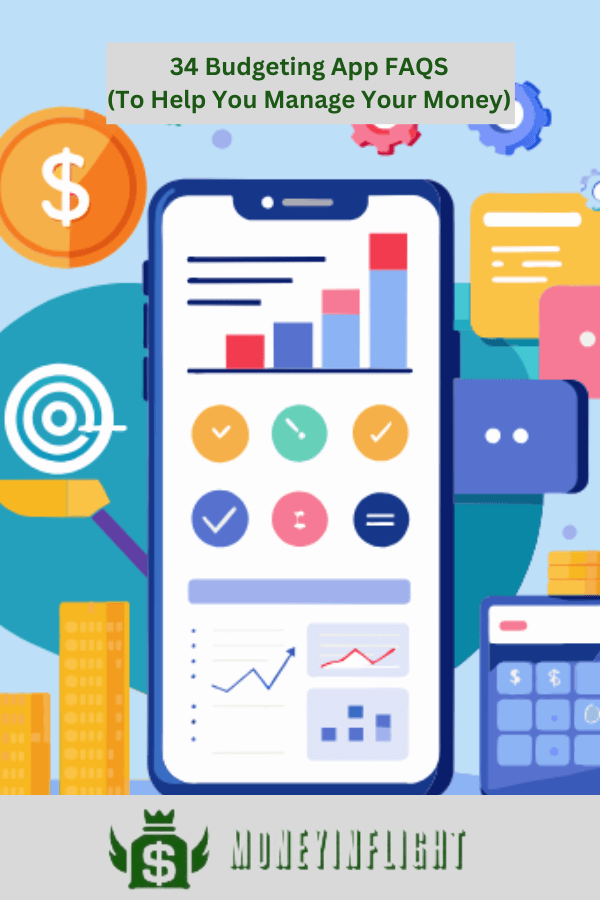DISCLOSURE: THIS POST MAY CONTAIN AFFILIATE LINKS, MEANING I GET A COMMISSION IF YOU DECIDE TO MAKE A PURCHASE THROUGH MY LINKS, AT NO COST TO YOU. PLEASE READ MY DISCLOSURE FOR MORE INFO.
Budgeting apps are an essential tool for anyone looking to manage their money effectively. From tracking expenses and setting financial goals to creating budgets and managing debt, budgeting apps provide a wide range of features to help you stay on top of your finances.
Below are 34 Budgeting App FAQs (to help manage your money)
What is a budgeting app?
A budgeting app is a software application designed to help individuals track their income and expenses, set financial goals, and create a budget plan. It enables users to manage their finances more effectively by providing tools to track expenses, categorize spending, and monitor progress toward savings goals.
How does a budgeting app work?
A budgeting app typically requires users to link their financial accounts, such as bank accounts, credit cards, and investment accounts. The app then automatically tracks transactions and categorizes them into different expense categories. Users can set a budget for each expenditure category and monitor their progress toward meeting their goals.
Are there any fees associated with using a budgeting app?
Many budgeting apps are free to use, but some may charge a fee for premium features or advanced functionality. It’s important to research the pricing structure of the app before signing up to ensure that the fees are within your budget.
How can a budgeting app help me save money?
A budgeting app can help you save money by providing visibility into your spending habits and identifying areas where you can cut back on expenses. By setting a spending limit for each category and tracking your progress toward your goals, you’ll be more likely to avoid overspending and make better financial decisions.
How secure are budgeting apps?
Budgeting apps typically use encryption and other security protocols to protect user data. However, as with any other online service, there is always a risk of data breaches or security vulnerabilities. To ensure the security of your personal and financial information, it’s recommended that you choose an app with a good reputation for data security and take steps to secure your own devices and accounts.
What data do budgeting apps collect?
Budgeting apps typically collect basic personal and financial information, such as your name, email address, and financial account details. They may also collect data on your spending habits and financial transactions in order to provide personalized insights and recommendations. It’s important to carefully review the terms and privacy policy of any budgeting app you use to understand what data is being collected and how it is being used.
Can I link multiple bank accounts to my budgeting app?
Yes, many budgeting apps allow you to link multiple bank accounts, credit cards, and other financial accounts all in one place. Some popular apps that offer this feature include Mint, PocketSmith, and YNAB.
Can I create multiple budgets with a budgeting app?
Yes, most budgeting apps allow you to create multiple budgets for different categories or goals. For example, you might have one budget for groceries, another for entertainment, and a third for savings. Popular budgeting apps like Mint and EveryDollar allow you to create and track multiple budgets at once.
Can I set up automatic savings with a budgeting app?
Yes, many budgeting apps offer the ability to set up automatic savings transfers to help you reach your financial goals. For example, you might set up a rule to automatically transfer $100 from your checking account to your savings account every month. Popular budgeting apps like Mint and YNAB offer this feature.
How can a budgeting app help me find areas to cut expenses?
Many budgeting apps offer tools to help you identify areas where you can cut back on your expenses. For example, Mint can analyze your spending habits and suggest areas where you might be able to save money. PocketSmith offers a feature called “inflow and outflow,” which allows you to compare your income and expenses over time and identify any trends or issues.
Can I monitor my credit score with a budgeting app?
Some budgeting apps, like Mint, offer the ability to monitor your credit score as part of their service. Other apps, like Credit Karma, specialize in helping you monitor and improve your credit score.
How can I track my spending with a budgeting app?
Budgeting apps allow you to track your spending in a variety of ways. For example, you might manually enter your expenses as you make them or link your accounts so that your transactions are automatically recorded. Many budgeting apps also offer the ability to categorize your expenses (e.g., groceries, entertainment, etc.) to help you more easily understand where your money is going.
How can a budgeting app help me stay on track with my financial goals?
A budgeting app can help you stay on track with your financial goals by allowing you to set up and monitor your progress toward specific targets. For example, you might set a goal to save $10,000 for a down payment on a house or pay off $5,000 in credit card debt. The app can then help you track your progress toward these goals, providing actionable insights and alerts when you’re falling behind or need to adjust your spending.
Can a budgeting app help me pay off debt?
Yes, many budgeting apps offer features specifically designed to help users pay off debt. For example, the app may offer tools to help you create a debt repayment plan, track your progress towards paying off your balances, and identify areas where you can cut back on spending to put more towards debt payments. Popular budgeting apps like YNAB and Mint offer debt-repaying tools.
Can I use a budgeting app to create a financial plan for retirement?
Yes, some budgeting apps offer features to help you plan for retirement, such as allowing you to set up retirement savings goals, track your progress toward those goals, and identify retirement income streams. Examples of such apps include Personal Capital and PocketSmith.
How long does it take to set up a budgeting app account?
The length of time it takes to set up a budgeting app account depends on the specific app and how much information is required to set up the account. Some apps may require only basic information, like your name and email address, while others may require more detailed information, like your bank account login credentials. Typically, setting up an account takes between 5 and 10 minutes.
Is there any customer support available for users of a budgeting app?
Yes, most budgeting apps offer some form of customer support for their users. This may include access to a knowledge base of articles and FAQs, email support, or live chat support. Some apps, like YNAB, also offer the ability to schedule one-on-one coaching sessions with a personal finance expert.
How accurate are the budgeting app’s financial predictions?
The accuracy of a budgeting app’s financial predictions can vary depending on a number of factors, including the amount and accuracy of the data being fed into the app, the complexity of the financial model being used, and how well the predictions align with actual financial results. Ultimately, the accuracy of the financial predictions provided by a budgeting app will depend on the specific app and how well it fits your individual financial situation.
Can I customize my budget categories with a budgeting app?
Yes, most budgeting apps allow users to customize their budget categories to fit their individual needs. This means that you can create personalized categories for your expenses, like “coffee” or “rent,” and set specific spending limits for each. Some apps, like YNAB, even allow you to create custom categories for your income.
Can I categorize my transactions with a budgeting app?
Yes, categorizing each transaction is a key feature of most budgeting apps. When you link your bank or credit card accounts to the app, it will automatically import your transactions and categorize them based on rules that you’ve set up beforehand. You can also manually categorize transactions if the app doesn’t categorize them correctly.
Can I create shared budgets with family or friends using a budgeting app?
Yes, some budgeting apps allow you to create shared budgets with family or friends. This can be especially useful if you have joint expenses with others, like rent, utilities, or groceries. You can set up a shared budget in the app and invite others to join, allowing everyone to see their contributions and track their spending.
How often should I update my budget on a budgeting app?
It’s generally recommended to update your budget on a budgeting app at least once a week. This will help you stay on top of your spending and make adjustments as needed. However, the frequency of updates will depend on your individual financial situation and how frequently your income and expenses change. When you first start using a budgeting app, it may take some time to get into the habit of updating your budget regularly. However, the more frequently you update it, the more accurate and useful it will be.
Can I access my budgeting app account from multiple devices?
In most cases, yes, you can access your budgeting app account from multiple devices. Most budgeting apps are cloud-based, which means that your data is stored on remote servers and can be accessed from anywhere with an internet connection. You just need to sign in to your account on each device to access your budget information.
Can I set up bill reminders with a budgeting app?
Yes, setting up bill reminders is a common feature of many budgeting apps. You can usually add a bill reminder by entering the name of the bill, the amount, the due date, and the frequency of the bill. The app will then send you a notification or email when the bill is due.
Can a budgeting app help me create a savings plan?
Yes, many budgeting apps have built-in savings plan features that can help you set and track savings goals. You can generally set goals like saving for an emergency fund, a down payment on a house, or a vacation, and the app will help you track your progress toward those goals.
How can a budgeting app help me build my credit score?
Some budgeting apps may be able to help you build your credit score indirectly by helping you manage your finances more effectively. This can include things like setting up bill reminders so you don’t miss payments, tracking your credit card balances to avoid overspending, and creating a budget that allows you to allocate funds to pay off debt.
Can a budgeting app help me maximize my cashback and rewards?
Yes, some budgeting apps can help you maximize your cashback and rewards by analyzing your spending patterns and recommending credit cards or rewards programs that are a good fit for your lifestyle. Some apps also allow you to link your rewards program accounts so you can track and manage your rewards points in one place.
Can I export my budgeting app data to a spreadsheet or other software?
In most cases, yes, you can export your budgeting app data to a spreadsheet or other software. Many budgeting apps allow you to download your data as a CSV or Excel file, which can be opened in a variety of programs, including Microsoft Excel and Google Sheets. This can be useful if you want to do your own data analysis or create custom reports.
Can a budgeting app connect to investment accounts?
Yes, some budgeting apps may be able to connect to investment accounts. This can help you track the performance of your investments and see how they fit into your overall financial picture. However, not all budgeting apps have this feature, so you’ll need to check the specific app you’re interested in using to see if it offers this functionality.
How can a budgeting app help me plan for big purchases?
A budgeting app can help you plan for big purchases by allowing you to set savings goals and track your progress toward them. You can create a category for the purchase you’re saving for (like a down payment on a house or a new car), set a target amount, and allocate a certain amount of money from your budget toward that goal each month. The app will help you track your progress toward that goal and let you know when you’ve reached your target amount.
Can I use a budgeting app to monitor my income and expenses as a freelancer or small business owner?
Yes, you can use a budgeting app to monitor your income and expenses as a freelancer or small business owner. Many budgeting apps allow you to categorize your income and expenses, which can help you get a clear picture of your cash flow and track your profits and losses over time. Some apps may even have features specifically designed for small business owners or freelancers, like the ability to track project expenses or invoice clients directly from the app.
Can I track my investments with a budgeting app?
Yes, some budgeting apps may allow you to track your investments. This can include things like connecting to investment accounts, tracking the performance of your investments, and notifying you when investments need attention. Again, not all budgeting apps offer this feature, so you’ll need to do some research to find an app that works for you.
Does a budgeting app have a mobile app or web app interface?
Most budgeting apps offer both a mobile app and a web app interface. This can make it easy to access your budget information from any device, whether you’re at home or on the go. Some apps may work better on one platform or another, so you’ll need to check the specific app you’re interested in to see what platforms it supports.
Can a budgeting app help me manage my student loans and repayment strategies?
Yes, some budgeting apps may have built-in features that can help you manage your student loans and repayment strategies. These features can include things like tracking your student loan balances, interest rates, and payment due dates, as well as helping you create a repayment plan and setting reminders for loan payments. Some apps may even provide educational resources and tools to help you understand your loan options and repayment strategies. However, not all budgeting apps offer this feature, so you’ll need to do some research to find an app that provides the tools you need to manage your student loans.
Final Thoughts
Budgeting apps are essential for anyone looking to manage their money effectively. With the FAQs above, you should be more equipped to budget like a pro.

Personal finance geek and explorer of the web who loves to post in-depth blog posts about his findings.

